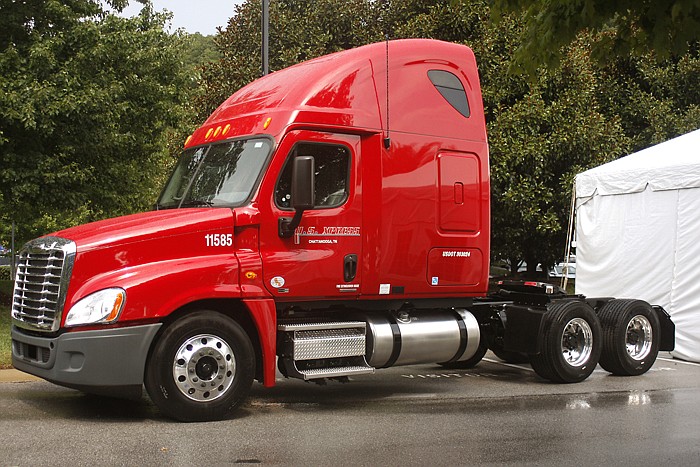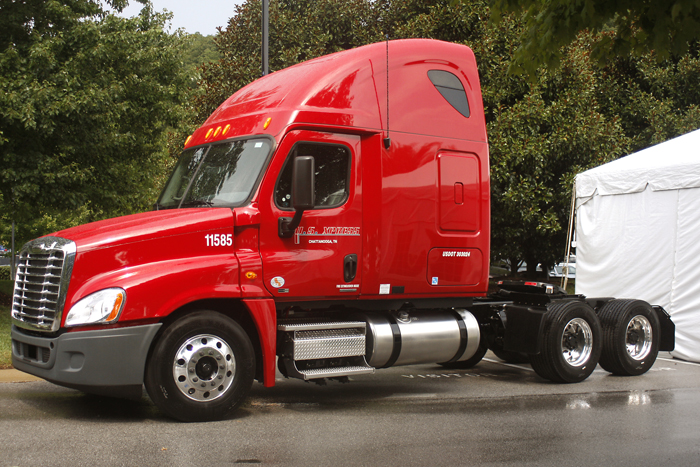The truck transportation industry came to a screeching halt in late 2008, officials say, and many trucking companies never got started up again.
Loads shrank, freight prices fell and truck driving schools stopped taking applicants.
Thousands of trucking companies went bankrupt, and those that survived did so because they grew leaner in an attempt to bring down expenses.
Now more than two years later, experts predict that the trucking industry could start expanding at 3 percent to 5 percent, as the new year marks something of a return to normalcy.
The solid 2010 Christmas buying season was a signal that consumers are ready to return to stores, and trucking companies like Chattanooga-based U.S. Xpress and Covenant Transport say they're anticipating more demand for their services in the new year.
But they're not out of the woods yet. Government regulations are expected to lead to driver shortages, and the burden of increasingly expensive tractors will be passed on to the consumer in the form of higher freight rates, said Glen Kedzie, vice president of environmental affairs for the American Trucking Associations.
"These costs are going to have to be covered in some way, shape or form, and if something has to give, it's going to be higher freight costs," Kedzie said.
And until the recovery begins in earnest, truckers remain in "no-growth" mode, said Pat Quinn, president and co-chairman of U.S. Xpress as well as the former head of the American Trucking Associations.
"We're not back to where we were prerecession," Quinn said.
Mark Pare, senior vice president for sales and marketing at Covenant Transport, said a lot more needs to happen before he's ready to declare that a recovery is under way.
"Personally, I'm not sure we have seen the best of the recovery," Pare said, citing high unemployment and a slow housing market.
More expensive tractors
The U.S. Environmental Protection Agency-mandated diesel engines on new trucks cost tens of thousands of dollars more than engines manufactured as recently as 2006, Kedzie said, which is made more problematic because trucking companies have held off on purchasing new tractors because of recessionary cost-cutting measures.
"You can only keep maintaining those trucks to a certain level for a certain period of time," he said. "At some point you're going to have to break down and start replacing your old equipment, no matter how well you maintain it."
Trucking companies typically replace a quarter of their fleets each year, but the replacement rate is currently around 3 percent to 5 percent, he said, and the cost to replace an aging stock of trucks now will be harder to bear than ever before.
"No one is adding equipment; there's probably going to be a shortage of equipment next year," Quinn said. "Even if there's modest economic growth, there'll be no more trucks to move it."
A tractor and three trailers in 2006 cost about $130,000, while the same equipment in 2011 could cost closer to $195,000 because of the increased emissions controls, he said.
The growing demand on diminished fleet sizes will definitely lead to increased freight rates, he said, because of "increased pricing power and leverage."
Profits gained from higher rates could be used down the road to upgrade capacity as needed, but for the moment the only noticeable difference will be more expensive consumer goods, he said.
Driver shortages
Two government safety programs designed to increase road safety are expected to exacerbate the shortage of drivers already cited as a problem by most trucking companies, officials say.
Quinn said he already has 100 trucks sitting empty for lack of drivers, despite high unemployment and salaries of $40,000 to $50,000 per year.
But new measures are being put in place to track driver hours electronically and the maximum allowable number could be reduced this year. A national database to track each driver's safety record that is coming online could make it even harder to keep truck cabs full.
"Driver wages are going to be increased over the next few years, 20 to 25 percent," Quinn said.
In addition, because drivers will be spending less time on the road this year, trucking companies may add two drivers to a truck that only required one to operate previously, he said.
These costs, too, likely will be passed onto the consumer in the form of higher-priced consumer goods, Pare said.
"These initiatives can exacerbate the current shortage of qualified truck drivers and may increase the price of our services as we search for and hire additional driving staff," he said.
Smaller companies
Increasing the cost of doing business does no favors for smaller businesses, Kedzie said, because smaller companies are less able to bear the burden of increasing tractor, driver and maintenance costs.
"What happens to the one- and two- and three-truck operations that can't afford the increased cost of fuel, can't afford higher wages, can't afford new equipment?" Kedzie asked. "What happens to them?"
What has happened so far is that they've gone bankrupt by the thousands, according to ATA statistics, and their routes have been picked up by competitors.
This leaves fewer companies to compete for freight dollars, which could lead to higher rates in the future.
"If one smaller company is hurting, some of the other companies will pick up their business," Kedzie said.
The road ahead
The road ahead is full of unknowns, including the potential impact of the national health care law and uncertainty stemming from a roller-coaster economy and rising fuel prices, officials say, but 2011 should still be "a considerable step forward," Quinn said.
Trucking led the economy into the recession, and it has the potential to lead it back out.
"We're the barometer," said Kedzie. "When the economy starts picking up, we find out first."
And truckers now are "starting to feel more confident," he said.
Pare expects 2011 to be "an interesting year," that should produce solid growth in revenue "if the economy gives us even a little bit of help," thanks to cost control measures enacted during the recession.
And though a recovery may very well be on the way, it's not here yet.
"We generally see the uptick months before the economists see it," Pare said. "We haven't seen it yet, but we are hopeful each and every day."

